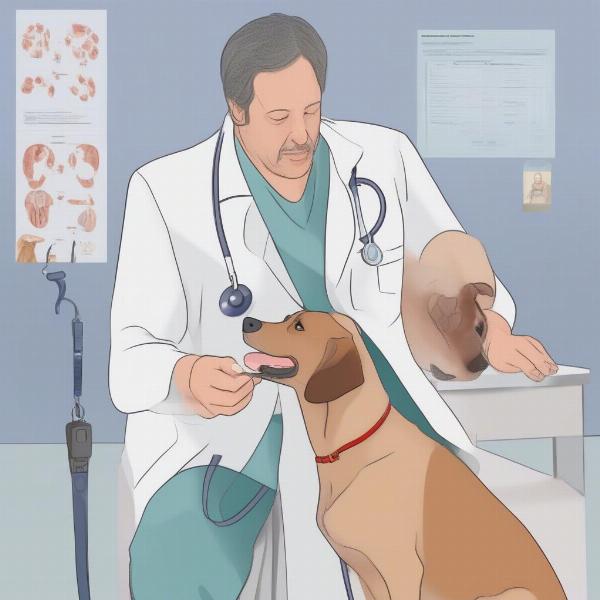Cabergoline for dogs is a medication primarily used to treat false pregnancy (pseudopregnancy) and sometimes to suppress lactation. It can also be used to treat other hormonal imbalances, although its use in these cases is less common. Understanding the appropriate usage, potential side effects, and necessary precautions is crucial for any dog owner considering this medication.
Understanding Cabergoline and Its Uses
Cabergoline belongs to a class of drugs known as dopamine agonists. These drugs work by mimicking the effects of dopamine, a neurotransmitter in the brain. In dogs, cabergoline primarily targets the pituitary gland, reducing the production of prolactin, a hormone responsible for milk production and certain aspects of reproduction. This mechanism of action makes it effective in treating conditions related to elevated prolactin levels.
Treating False Pregnancy in Dogs
False pregnancy, also known as pseudocyesis, is a common condition in unspayed female dogs. It mimics the symptoms of pregnancy, including mammary gland development, milk production, nesting behavior, and even maternal aggression, despite the dog not actually being pregnant. Cabergoline can effectively reduce these symptoms by lowering prolactin levels.
Suppressing Lactation in Dogs
Cabergoline can also be used to suppress lactation in dogs, whether it’s following a false pregnancy, the weaning of puppies, or in cases where lactation is undesirable for medical reasons. The drug quickly and effectively reduces milk production, helping to alleviate discomfort and prevent potential complications like mastitis.
Other Uses of Cabergoline in Dogs
While less common, cabergoline may be prescribed for other conditions related to hormonal imbalances, such as pituitary tumors that overproduce prolactin. These cases require careful veterinary monitoring and dosage adjustments.
 Cabergoline Usage in Dogs
Cabergoline Usage in Dogs
Dosage and Administration of Cabergoline
The dosage of cabergoline for dogs varies depending on the specific condition being treated and the individual dog’s size and health. It’s essential to follow your veterinarian’s prescribed dosage and administration instructions precisely. Never administer cabergoline without veterinary guidance.
Potential Side Effects of Cabergoline
While generally well-tolerated, cabergoline can have potential side effects in some dogs. These side effects can include:
- Loss of appetite
- Vomiting
- Diarrhea
- Lethargy
- Low blood pressure
If your dog experiences any of these side effects, contact your veterinarian immediately.
Precautions and Contraindications
Cabergoline is not suitable for all dogs. It should be used with caution in dogs with liver or kidney disease, and it’s generally contraindicated in pregnant dogs. Inform your veterinarian about any other medications your dog is taking, as there may be potential drug interactions.
What to Expect After Administering Cabergoline
After administering cabergoline, you should observe your dog for any changes in behavior or signs of side effects. In cases of false pregnancy, you should see a gradual reduction in symptoms, such as decreased milk production and nesting behavior. For lactation suppression, milk production should cease within a few days.
Monitoring Your Dog’s Progress
Regular veterinary check-ups are important to monitor your dog’s response to cabergoline and to adjust the dosage if necessary. Your veterinarian may recommend blood tests to assess prolactin levels and overall health.
Conclusion
Cabergoline can be a valuable medication for managing specific conditions in dogs, particularly false pregnancy and unwanted lactation. However, responsible usage requires veterinary supervision and careful monitoring. Always follow your veterinarian’s instructions and be aware of potential side effects. By understanding the proper use of cabergoline, you can help ensure your dog’s health and well-being.
FAQ
- How long does it take for cabergoline to work in dogs? Cabergoline typically starts working within a few days, but the full effects may take longer to be noticeable.
- Can cabergoline be used in male dogs? Yes, cabergoline can be used in male dogs, but it’s less common. It might be prescribed for conditions related to prolactin-producing tumors.
- What should I do if I miss a dose of cabergoline? Contact your veterinarian for advice if you miss a dose. Do not double the dose.
- Is cabergoline safe for long-term use in dogs? Long-term use may be necessary for some conditions, but it requires careful veterinary monitoring.
- Are there any natural alternatives to cabergoline for dogs? While some herbal remedies are purported to have similar effects, it’s crucial to discuss any alternative treatments with your veterinarian before using them.
- Can I purchase cabergoline over-the-counter? No, cabergoline requires a prescription from a veterinarian.
- How should cabergoline be stored? Store cabergoline as directed on the medication label, typically in a cool, dry place away from direct sunlight.
ILM Dog is your trusted global resource for expert dog care advice. We cover every aspect of dog ownership, from breed selection to senior dog care. Our articles are written by experienced professionals and tailored to a global audience, ensuring you have the information you need to provide the best possible care for your canine companion. For tailored advice or more information, please contact us at [email protected] or call us at +44 20-3965-8624. Visit ILM Dog for a wealth of resources to help you navigate the joys and responsibilities of dog ownership.